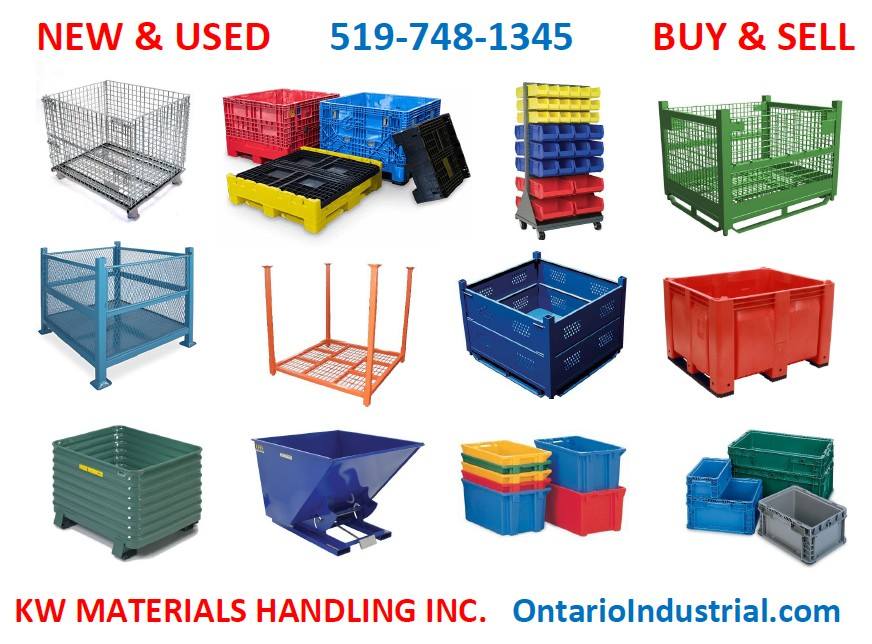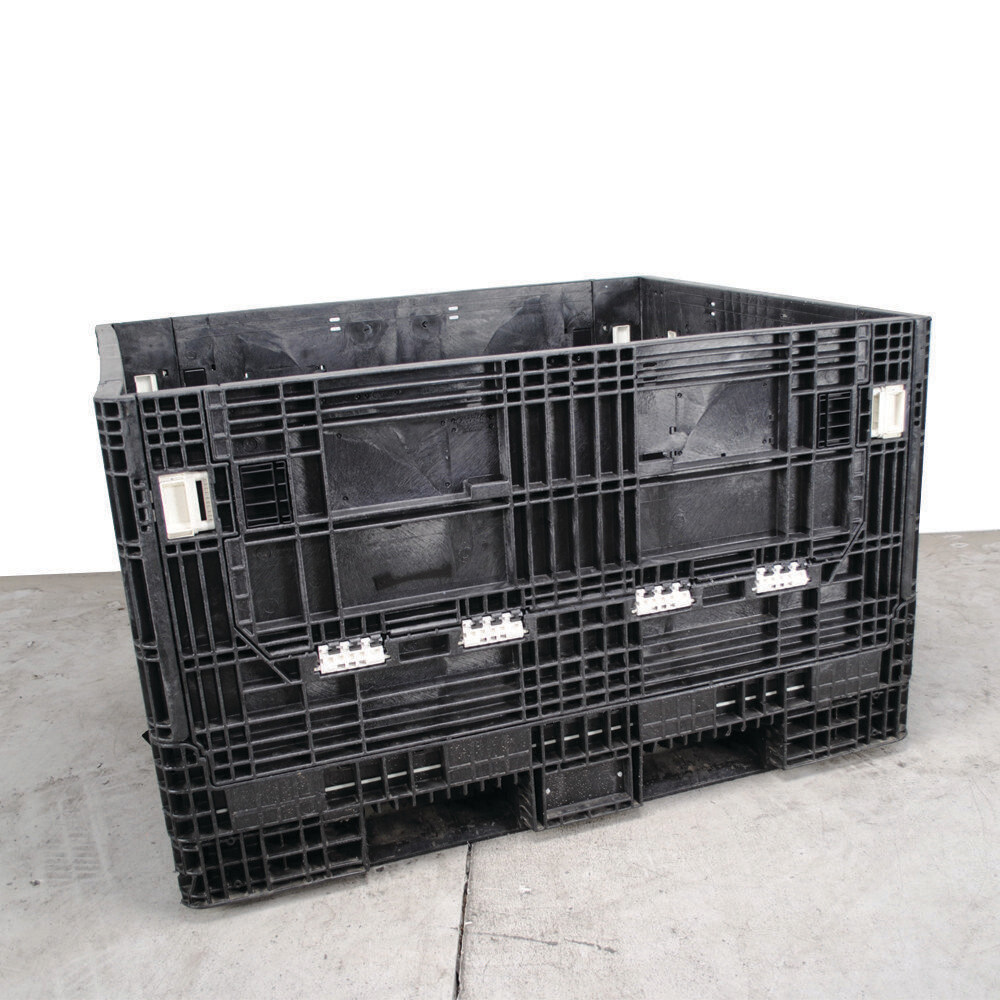Why refurbished bulk containers are eco-friendly solutions for sustainable businesses
Why Bulk Containers Are Vital for Cost-efficient and lasting Transport
Bulk containers play a necessary function in modern logistics. They help with the efficient activity of huge amounts of products, thus optimizing transportation processes. This approach not just decreases costs yet additionally decreases ecological influence via reduced discharges and waste generation. As markets seek more sustainable practices, the fostering of bulk containers is coming to be significantly substantial. What effects does this change hold for future logistics and supply chain administration?

The Advantages of Using Bulk Containers in Logistics
Bulk containers transform logistics by improving efficiency and sustainability. These containers permit the transport of big amounts of items in a solitary trip, substantially reducing the number of trips needed. This not just enhances procedures yet additionally reduces labor expenses connected with handling, filling, and discharging. Additionally, mass containers are created to maximize area use within transportation vehicles, making certain that more products can be shipped at the same time.
The standardization of mass containers also simplifies the logistics procedure. With consistent measurements, they can be easily stacked and saved, leading to boosted warehouse administration. Bulk containers frequently feature sturdy products that protect contents from damages throughout transit, thereby decreasing product loss and enhancing total dependability. Therefore, services can experience enhanced supply chain efficiency, eventually leading to raised earnings and customer satisfaction. This mix of aspects makes bulk containers a crucial property in modern logistics.
Ecological Impact: Reducing Waste and Carbon Impact
As sectors increasingly focus on sustainability, the adoption of mass containers has actually arised as a key strategy for minimizing waste and lowering carbon impacts. These containers minimize using product packaging materials, such as boxes and plastic, therefore especially decreasing general waste generation. By consolidating shipments, bulk containers improve transport performance, permitting even more items to be carried per journey. This decrease in trips directly associates with lower greenhouse gas discharges, adding to a smaller carbon footprint.
In addition, bulk containers can typically be recycled or reused, better reducing ecological impact. The resilience of these containers warranties they can hold up against multiple transport cycles, decreasing the requirement for single-use choices. refurbished bulk containers. By enhancing logistics and advertising efficient resource usage, mass containers not just sustain lasting techniques yet likewise encourage industries to line up with global ecological goals. Inevitably, their application mirrors a commitment to ecological stewardship and responsible resource administration
Cost Financial Savings: Just How Bulk Containers Lower Transportation Expenditures
While numerous firms seek means to enhance their bottom line, using mass containers provides a considerable chance for lowering transport costs. Bulk containers optimize the volume of products carried, allowing businesses to deliver larger amounts simultaneously. This effectiveness reduces the variety of journeys required, straight reducing fuel expenses and reducing labor expenses related to loading and discharging.
Additionally, mass containers frequently feature structured designs that enhance space usage within transport lorries. This suggests fewer voids, leading to a lot more reliable use offered capacity. Additionally, the toughness of bulk containers can reduce the threat of item damages during transportation, making sure and minimizing losses that more items get here intact.
Enhancing Supply Chain Efficiency With Mass Storage Space Solutions
Mass storage space services play an essential role in enhancing supply chain efficiency by maximizing stock monitoring. By consolidating items into fewer, larger containers, companies can considerably minimize handling expenses related to constant transfers and processing. This streamlined strategy permits much better monitoring and administration of inventory, ultimately causing boosted functional performance.
Structured Supply Management
Reliable inventory management is necessary for maximizing supply chain procedures, specifically when organizations take on bulk storage services. These services enable services to maintain greater supply levels while decreasing the regularity of replenishment. By consolidating materials into mass containers, companies can streamline their supply procedures, decreasing the complexity related to tracking multiple smaller sized packages. This approach assists in accurate supply counts and improves forecasting precision, permitting even more informed decision-making. Furthermore, mass storage options simplify storage facility company, making it simpler to locate and gain access to items when required. Because of this, companies can attain an extra effective supply turnover rate, eventually enhancing general supply chain performance and minimizing the likelihood of stockouts or overstock situations.

Minimized Handling Prices
The execution of bulk storage options not just streamlines stock administration however likewise substantially minimizes handling prices throughout the supply chain. By consolidating materials right into mass containers, business minimize the demand for regular handling and transfer between various storage and transportation systems. This strategy lowers labor costs related to loading, dumping, and moving smaller sized bundles. Additionally, mass storage space decreases the regularity of deliveries, bring about lower transport costs and decreased gas usage. Because of this, organizations can maximize their logistics procedures, enabling a much more reliable allocation of sources. Eventually, reduced handling expenses add to boosted overall supply chain performance, fostering an environment that sustains both sustainability and economic practicality.

Adaptability of Mass Containers Throughout Numerous Industries
Several sectors have distinct requirements for transportation and storage space, bulk containers have emerged as a versatile option that meets a broad range of needs. These containers, ranging from huge bins to specialized storage tanks, can accommodate varied products, including granules, fluids, and powders. In the farming market, bulk containers facilitate the transport of grains and plant foods, while the food and beverage market uses them for ingredients and completed products. The chemical industry depends on bulk containers for safely transferring harmful products, making certain conformity with safety policies. In addition, building and construction firms gain from mass containers for moving aggregates and other products. Their adaptability reaches various settings of transportation, consisting of ships, trucks, and trains, boosting logistical effectiveness. This convenience not just improves procedures across different sectors yet likewise promotes sustainability by minimizing packaging waste and maximizing area en route. Mass containers play a necessary duty in modern-day supply chain monitoring.
Future Trends in Mass Container Use and Sustainability
The future of bulk container usage is progressively shaped by ingenious products growth that boosts sustainability. Additionally, automation in logistics assures to simplify operations, decreasing waste and boosting effectiveness. Welcoming circular economic situation techniques will certainly additionally reinvent just how bulk containers are created, utilized, and recycled, cultivating an extra sustainable transport landscape.
Cutting-edge Materials Development
As markets significantly prioritize sustainability, innovative materials development wholesale containers emerges as a significant element in boosting eco-friendly transport options. Makers and researchers are checking out naturally degradable plastics, recycled composites, and light-weight metals to reduce ecological effect. These products not only reduce waste however also improve fuel performance by decreasing the overall weight of containers. Furthermore, improvements in clever materials, which can adjust to varying problems, improve the durability and capability of mass containers. The integration of these innovative materials lines up with round economy concepts, advertising reuse and recycling. As the demand for sustainable practices grows, the development of such products will play a vital role in shaping the future of mass container usage in logistics and transportation.
Automation in Logistics
Significant advancements in automation are poised to change logistics and the application of mass containers, boosting sustainability in transportation. Automated systems, including drones and independent automobiles, are enhancing the motion of bulk containers, minimizing the reliance on standard fuel-powered transport. These modern technologies optimize routing and filling procedures, boosting and reducing empty miles gas performance. Furthermore, automated stock monitoring systems enhance tracking and surveillance of bulk containers, making certain better source allotment and decreased waste. The integration of the Web of Points (IoT) enables real-time data evaluation, enabling proactive decision-making that aligns with sustainability objectives. As automation continues to progress, it is expected to drive further innovations in mass container usage, inevitably supporting even more lasting logistics methods and decreasing the ecological influence of transportation.
Circular Economic Climate Practices
Developments in automation are setting the stage for an extra incorporated technique to round economy practices in the domain name of bulk container usage. As markets progressively welcome sustainability, bulk containers are being created for longevity and reusability. This shift not just minimizes waste however additionally boosts resource effectiveness. Firms are embracing approaches such as closed-loop systems, where utilized containers are accumulated, refurbished, and reestablished into the supply chain. Additionally, wise technologies track container life cycles, helping with better management and lowering ecological impact. The cooperation in between suppliers, logistics suppliers, and end-users is important in developing criteria for lasting container use. used plastic containers. Future trends indicate a growing emphasis on materials that are naturally degradable and recyclable, more reinforcing the circular economy's principles in bulk transportation

Frequently Asked Concerns
What Products Are Mass Containers Generally Made From?
Mass containers are typically built from long lasting products such as high-density polyethylene, light weight aluminum, steel, and cardboard. These products provide strength, flexibility, and security, making them suitable for transferring numerous items in various sectors effectively.
Just how Do I Pick the Right Size Bulk Container?
Choosing the best size bulk container involves evaluating the volume of products to be transferred, taking into consideration handling equipment compatibility, and evaluating storage room needs. Correct size assurances efficiency in transportation and minimizes waste throughout delivery.
Are Bulk Containers Reusable or Recyclable?
Mass containers are commonly reusable, developed for numerous journeys, enhancing sustainability. Several can also be reused, relying on the materials made use of. Choosing recyclable alternatives better decreases and supports environmental objectives waste in transportation practices.
What Security Laws Apply to Mass Container Transportation?
Safety guidelines for mass container transport consist of conformity with the Department of Transport guidelines, correct labeling of harmful materials, architectural integrity analyses, and adherence to weight limitations to guarantee risk-free handling and prevent crashes during transportation.
Exactly How Can Businesses Change to Using Mass Containers Efficiently?
Services can change to bulk containers read more by evaluating present logistics, educating team on handling, buying ideal devices, enhancing supply management, and working together with suppliers to assure compatibility and effectiveness throughout the supply chain.
As sectors significantly prioritize sustainability, the fostering of bulk containers has arised as an essential strategy for lowering waste and reducing carbon footprints. By combining materials right into mass containers, firms can streamline their inventory procedures, decreasing the complexity linked with tracking multiple smaller plans. As markets progressively prioritize sustainability, ingenious materials growth in mass containers emerges as a considerable aspect in boosting environment-friendly transport remedies. Automated systems, including drones and autonomous cars, are improving the motion of mass containers, reducing the reliance on traditional fuel-powered transport. Additionally, automated inventory management systems enhance tracking and monitoring of bulk containers, ensuring better resource appropriation and reduced waste.